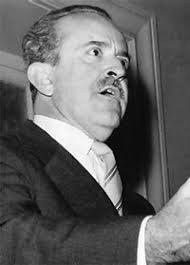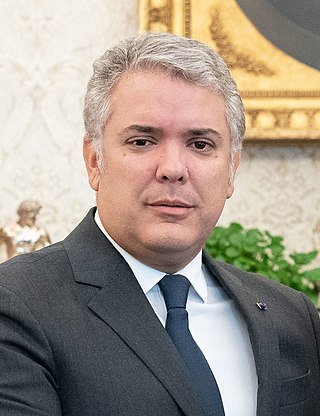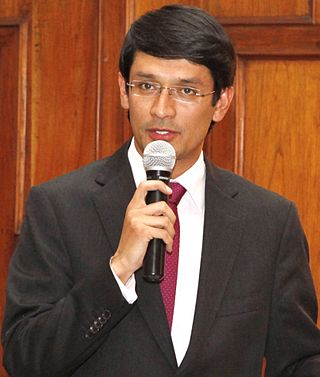
The Colombian Liberal Party is a centre to centre-left political party in Colombia. It was founded as a classical liberal party but later developed a more social-democratic tradition, joining the Socialist International in 1999.

Guillermo León Valencia Muñoz was a Colombian politician, lawyer and diplomat who served as the 21st President of Colombia from 1962 to 1966.
Álvaro Araújo Castro is a Colombian economist and former actor and Senator of Colombia. A Liberal politician, leader of the ALAS-Team Colombia political movement, and founder of Alternative for Social Advance (ALAS); he was arrested and jailed in 2007 for participating in parapolitics. Prior to serving in the Senate, he was also a Member of the Chamber of Representatives of Colombia from 1994 to 2001.

The Ministry of Finance and Public Credit, is the national executive ministry of the Government of Colombia responsible for the financial and budgetary matters of the country as well as implementing the financial policies passed by Congress, equivalent to the finance ministries of other countries.

Juan Manuel Santos Calderón is a Colombian politician who was the President of Colombia from 2010 to 2018. He was the sole recipient of the 2016 Nobel Peace Prize.

Gustavo Francisco Petro Urrego is a Colombian politician who is the 34th and current president of Colombia since 2022. Upon inauguration, he became the first left-wing president in the recent history of Colombia.

Presidential elections were held in Colombia on 25 May 2014. Since no candidate received 50% of the vote in the first round, a run-off between the two candidates with the most votes took place three weeks later on 15 June 2014. According to the official figures released by the National Registry office, as of 22 May 2014 32,975,158 Colombians were registered and entitled to vote in the 2014 presidential election, including 545,976 Colombians resident abroad. Incumbent president Juan Manuel Santos was allowed to run for a second consecutive term. In the first round, Santos and Óscar Iván Zuluaga of the Democratic Center were the two highest-polling candidates and were the contestants in the 15 June run-off. In the second round, Santos was re-elected president, gaining 51% of the vote compared with 45% for Zuluaga.

Presidential elections were held in Colombia on 27 May 2018. As no candidate received a majority of the vote, the second round of voting was held on 17 June. Incumbent president Juan Manuel Santos was ineligible to seek a third term. Iván Duque, a senator, defeated Gustavo Petro, former mayor of Bogotá, in the second round. Duque's victory made him one of the youngest individuals elected to the presidency, aged 42. His running mate, Marta Lucía Ramírez, was the first woman elected to the vice presidency in Colombian history.

Iván Duque Márquez is a Colombian politician and lawyer who served as the president of Colombia from 2018 to 2022. He was elected as the candidate from the Democratic Centre Party in the 2018 Colombian presidential election. Backed by his mentor, former president and powerful senator Álvaro Uribe, he was elected despite having been relatively unknown a year before the election. He ran on a platform that included opposing Juan Manuel Santos' peace agreement with the FARC guerrilla group. After Duque's term came to an end, he was succeeded by Gustavo Petro on 7 August 2022, after Petro won the runoff round in the 2022 Colombian presidential election.

Francia Elena Márquez Mina is a Colombian human-rights and environmental activist and lawyer, who is the 13th and current Vice President of Colombia. She was born in Yolombó, a village in the Suarez municipality in Cauca Department. She first became an activist at 13, when construction of a dam threatened her community. On taking office, she became the first Afro-Colombian vice president in the country's history. She is also the second woman to hold the post, after Marta Lucía Ramírez. In August 2020, Márquez announced her candidacy in the 2022 Colombian presidential election and sought the nomination for the Historic Pact for Colombia coalition. She was later chosen by the coalition's nominee, Gustavo Petro, to be his running mate. In 2023 she was also appointed as Minister for Equality and Equity.
Humane Colombia, formerly known as the Progressive Movement, is a Colombian left-wing political movement and party founded in 2011 and led by President Gustavo Petro. The youth wing of the party is known as Juventud Humana.

Ángela María Robledo Gómez is a Colombian psychologist and left-wing politician. Currently a member of the Chamber of Representatives, Robledo is a former dean of psychology at Pontifical Xavierian University.

Presidential elections were held in Colombia on 29 May 2022, with a runoff on 19 June 2022 as no candidate obtained at least 50% in the first round of voting. Iván Duque, who was elected president in 2018, was ineligible to run due to term limits. Gustavo Petro, a senator, former Mayor of Bogota, and runner-up in the 2018 election, defeated Rodolfo Hernández Suárez, former mayor of Bucaramanga, in the runoff election. Petro's victory made him the first left-wing candidate to be elected president of Colombia, and his running mate, Francia Márquez, is the first Afro-Colombian elected to the vice-presidency, as well as the second female vice-president overall.

Rodolfo Hernández Suárez was a Colombian politician, civil engineer, and businessman who served as a senator of Colombia from July to October 2022. He was mayor of Bucaramanga from 2016 until his resignation in 2019. As the nominee for the League of Anti-Corruption Governors (LIGA) coalition, Hernández placed second in the first round of the 2022 Colombian presidential election, and he was ultimately defeated by Gustavo Petro in the second round run-off election. Hernández briefly served in a senate seat offered to the runner-up in a presidential election and took office on 20 July and resigned in October that same year.

Marelen Castillo Torres is a Colombian teacher, biology and chemistry graduate, industrial engineer, and researcher. She is a member of the Chamber of Representatives of Colombia.

Camilo Ernesto Romero Galeano is a Colombian journalist and politician who served as Governor of Nariño from 2016 to 2019. A member of the Green Alliance, Romero was an unsuccessful candidate in the 2022 Colombian presidential election, losing the Historic Pact for Colombia primary to Gustavo Petro.

Hernando Alfonso Prada Gil is a Colombian lawyer, university professor and politician, and was Minister of the Interior from 7 August 2022 to 26 April 2023.

The 2022 presidential campaign of Gustavo Petro In 2021, Petro declared that he would be running in the 2022 elections. In September 2021, Petro announced that he would retire from politics if his campaign were not to succeed, stating that he does not intend to be an "eternal candidate". Petro's campaign platform included promoting green energy over fossil fuels and a decrease in economic inequality. He has promised to focus on climate change and reducing greenhouse gas emissions that cause it by ending fossil fuel exploration in Colombia. He also pledged to raise taxes on the wealthiest 4,000 Colombians and said that neoliberalism would ultimately "destroy the country". Petro also announced that he would be open to having president Iván Duque stand trial for police brutality committed during the 2021 Colombian protests. Furthermore, he promised to establish the ministry of equality. Following his victory in the Historic Pact primary, Petro selected Afro-Colombian Human Rights and environmental activist and recipient of the Goldman Environmental Prize, Francia Márquez, to be his running mate.

The 2018 presidential campaign of Gustavo Petro in 2018, Gustavo Petro was again a presidential candidate, this time getting the second best result in voting counting in the first round on 27 May, and advanced to the second round. His campaign was run by publicists Ángel Beccassino, Alberto Cienfuegos and Luis Fernando Pardo. A lawsuit was filed by citizens against Iván Duque, Petro's right-wing opponent, alleging bribery and fraud. The news chain Wradio made the lawsuit public on 11 July, which was presented to the CNE. The state of the lawsuit will be defined by the Magistrado Alberto Yepes.
The 2022 Colombian presidential primaries were a series of public votes held on 13 March 2022. The major political coalitions of Colombia held the primaries to determine their presidential candidates for the 2022 Colombian presidential election that would be held two weeks later.
















